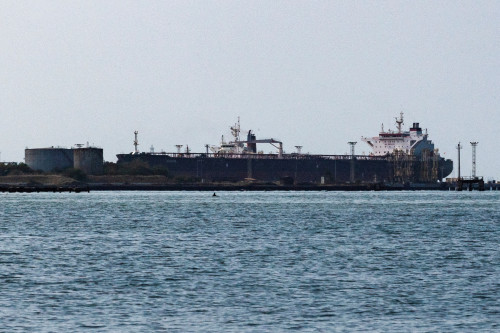(Reuters) -Tankers are lining up near an old oil port at Venezuela’s Western region to load crude cargoes and depart from the South American country before a May 27 deadline set by the U.S. to wind down operations and exports, according to documents and data.
U.S.-sanctioned Venezuela is set to inaugurate this month exports of a new crude grade, Blend 22, to lure customers even after the expiration of licenses Washington had granted to companies in the U.S., India and Europe to carry Venezuelan oil exports.
Because the grade is a blend of crudes produced by state-owned oil company PDVSA at its Western fields, exports must be shipped from La Salina, an aging and deteriorated terminal on the shores of Lake Maracaibo where tankers often get their hulls stained when docking due to oil leaking from submarine pipelines.
Vessels also cannot load more than 350,000 barrels of crude in that area because of Lake Maracaibo’s lack of dredging.
Most PDVSA customers typically avoid La Salina, but as the deadline approaches for buyers taking Venezuelan oil cargoes under U.S. licenses, some have taken the risk of loading there, which has begun triggering delays and a bottleneck of tankers waiting at Maracaibo’s anchorage, the documents and ship monitoring data showed.
A vessel chartered by trading house Vitol to load a 250,000-barrel cargo of Blend 22 allocated by PDVSA to France’s Maurel & Prom is having its hull cleaned this week after it completed loading last week, according to one of the documents.
The companies are scheduled to take a similar cargo after that as part of an oil swap that involves heavy naphtha for Venezuela, and three more could follow pending an agreement with PDVSA, according to a source close to the talks.
The neighboring Bajo Grande terminal, which was used by Chevron to ship crude from one of its joint ventures before PDVSA this month canceled the cargoes it had allocated to the U.S. firm, is now being used by the state company to load Boscan heavy crude for floating storage, the documents showed.
Of about a dozen vessels Chevron had near Venezuelan ports earlier this month before the cargo cancellations, five remain close to Aruba waiting for directions, while the others were sent to pick up cargoes elsewhere, according to LSEG ship data.
PDVSA, M&P and Chevron did not immediately reply to requests for comment. Vitol declined to comment.
President Nicolas Maduro’s government has criticized Washington’s hardening of sanctions on the country and said the measures amount to an “economic war.”
(Reporting by Reuters staffEditing by Marguerita Choy)


